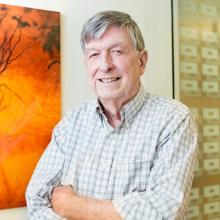Tuesday, February 20, 2024 | 12:00 - 1:00 PM
Special Seminar: Synapse Seminar Series
When: Tuesday, February 20, 2024, from 12:00 PM – 1:00 PM
Seminar Title: “A molecular machine for memory”
Guest Speaker: Roger Nicoll, M.D.
Seminar: Building 35, Room 620/630
NIH Host: Katherine Roche Ph.D., NINDS
Image

Roger Nicoll, M.D.
Professor, Cellular and Molecular Pharmacology
University of California, San Francisco
About the Speaker:
Dr. Roger Nicoll is a leader in the field of neuroscience who has won numerous awards for his seminal discoveries into the cellular and molecular mechanisms underlying synaptic plasticity in the brain. He received his undergraduate degree in biology and chemistry from Lawrence University before obtaining his M.D. from the University of Rochester. He began his neuroscience career at St. Elizabeths Hospital, where he studied neurotransmitters and their neuromodulatory effects. He aims to understand how electrical activity reshapes the brain’s connections and enables learning plasticity and memory formation. He is an elected member of the National Academy of Sciences and American Academy of Arts and Sciences and has authored more than 300 papers on his discoveries in the fields of synaptic physiology and biophysics.
Research:
Dr. Roger Nicoll’s Lab is interested in elucidating the cellular and molecular mechanisms underlying learning and memory in the mammalian brain. Long-term potentiation (LTP), a phenomenon in which brief repetitive activity causes a long-lasting (many weeks) enhancement in the strength of synaptic transmission, is generally accepted to be a key cellular substrate for learning and memory. Dr. Nicoll’s Lab uses a combination of electrophysiological and molecular techniques to elucidate the molecular basis of LTP. The Lab has found that LTP involves the rapid activity-dependent trafficking of glutamate receptors to the synapse. This trafficking requires the interaction of two families of synaptic proteins. One family is a novel group of proteins that, the Lab discovered bind to glutamate receptors and act as auxiliary subunits. These proteins are not only essential for the trafficking of the glutamate receptors but also control the gating of the receptor channel. The other family is comprised of a family of scaffolding proteins that bind to the auxiliary subunits and thereby anchor the receptors at the synapse. Much of the current work in the Lab is focused on how activity controls this receptor trafficking and how the increase in synaptic strength during LTP is stabilized and maintained.
